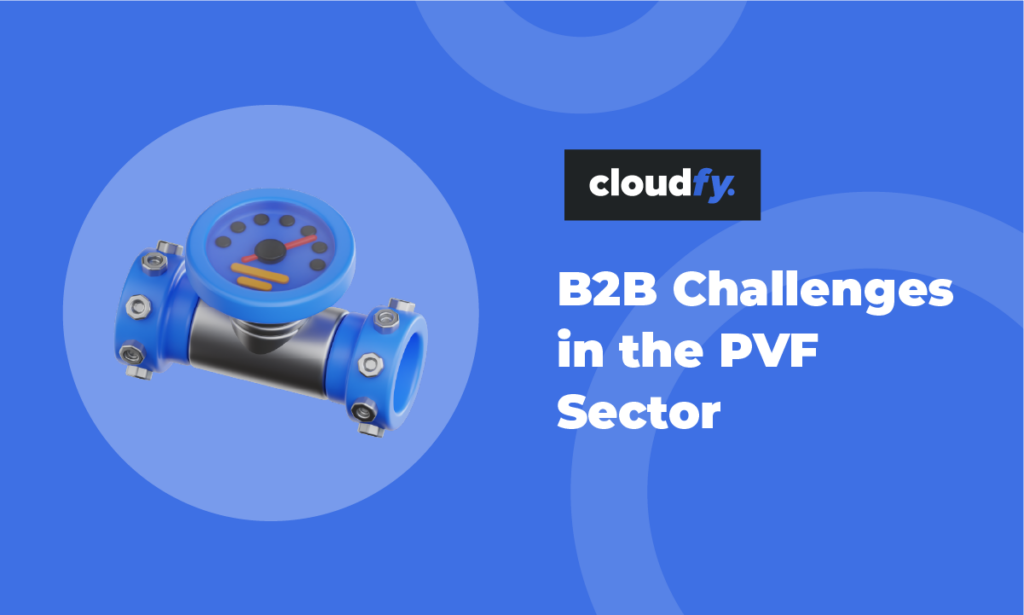Manufacturing business sales are likely to remain under pressure this year according to Deloitte in their 2020 Manufacturing Industry Outlook. Digitization is one of the tools forward-thinking manufacturers will be using to address the challenges they face in a market balanced between growth and contraction.
As business buying habits change, digitizing sales channels is becoming an essential step. Online research, inquiry, specification and purchase can all take place without any personal contact between customer and supplier. Typically, 70% of the buying process is already complete before your buyer contacts you. New businesses started by digital natives finding new ways to bring their products to market are also disrupting the marketplace.
Sales representatives in the field increasingly need real time information about stock availability, pricing and delivery to complete the sales process.
Advanced marketing analytics, mobile strategies, and process re-engineering will all help to maintain a competitive edge.
Digitally transforming your sales channel
Digital transformation can help to solve key strategic, operational, and organizational sales issues. Improving sales effectiveness can directly translate into additional revenue and profitability and can release resources to add value in other parts of your business.
Data-driven sales processes used to align lead generation to your customers’ journey can be up to five times more effective than traditional sales methods.
To be really effective organizational behavior needs to change, becoming focused on digital simplification and control.
Alignment with business values – the Industrial Internet of Things (IIoT) is unleashing the power of data throughout manufacturing, sales and delivery and artificial intelligence (AI) is enabling businesses to use the data to improve processes and monitor outcomes in real time.
The potential to improve efficiency, reduce costs and to personalize sales is huge, so it’s important your business has a clear view of immediate and future priorities. Digitally transforming your sales channel needs to be part of a wider business strategy that sets clear goals for the whole business.
The pace of change is fast. In their recent State of The Industrial Internet of Things report technology leaders, PTC, say that 89% of businesses expect their IIoT pilot projects to go live in the next 12 months.
Industrial organizations with digital transformation plans that are clearly value-based will be able to realize their goals more quickly and scale their digital transformation more effectively. Tapping into the new mindsets of digitally native transformation partners will also improve the rate of success.
Delivering operational efficiencies – experts are unclear about the implications of wider economic issues including global financial uncertainties and shortages of skilled workers. The Purchasing Manager’s Index (PMI) is hovering a little above 50, meaning just over half of manufacturers are optimistic about the future of the industry.
To remain resilient in this climate, industrial organizations need to control costs more tightly than ever before. Manufacturers will need technology solutions that optimize the capacity of their workforce, improve productivity, drive operational efficiencies and increase profitability.
The World Economic Forum (WEF) says that new technologies are redefining customer expectations and also enabling businesses to meet these new expectations, changing the way we all live and work. In terms of customer experience and outcomes, they say that customization will create ‘moments of truth’, supporting decision journeys, while integrated customer information across platforms will increase transaction speed.
Cloud-based solutions – the impact of delivering services in the Cloud will do much more than change the way manufacturing businesses manage their current IT resources. It will provide a cost effective and flexible way to introduce and scale innovative technologies and next-generation applications.
Manufacturers embracing digital transformation need a robust framework to manage their new, more integrated environments. The Cloud will allow IIoT infrastructure to be deployed efficiently and without geographic boundaries.
Cloud-based software as a service (SaaS) solutions allow traditional enterprise resource planning (ERP), warehousing, distribution and delivery systems to be upgraded, integrated and deployed with a much lower total cost of ownership because there’s no need to make capital investment in infrastructure. New releases and innovative features can be delivered in the Cloud and critical data and applications are available quickly and reliably.
Cloud-based strategies will become increasingly important for manufacturers. Global marketing intelligence company, IDC, predicts that by 2022, 70% of manufacturers will use Cloud-based innovation platforms and marketplaces to create up to half of their new products and service ideas.
Effective digital partnerships – one of the major challenges facing manufacturers is realizing the benefits of digital transformation across the whole organization. Culturally, local solutions and on-the-spot fixes are common, so shifting to an approach which accommodates every operational step from order to delivery will be challenging.
The solution is to carefully select a digital partner who can understand your business requirements and translate them into workable digital solutions. Effective collaboration can help you to manage costs, time, resources, and scalability.
Successful implementation increasingly relies on partnerships between manufacturers and experts who can deliver the benefits of Cloud-based solutions, security, infrastructure, development, and systems integration. This not only speeds up implementation but can also deliver added value to your business and customers.
Sustainability – expectations concerning carbon emissions, employee and public health and safety are all adding pressure for manufacturers. Sustainability credentials are becoming a strategic issue and part of your product offer, especially in the automotive and aerospace industries.
The Environmental Protection Agency (EPA) says that manufacturers are realizing substantial financial and environmental benefits from sustainable business practices. The benefits include reductions in costs and waste alongside longer term business viability. Importantly, they are building trust and reputation, reaching new customers and delivering competitive advantages.
Sales, customer acquisition and satisfaction
Increased connectivity and a fast-paced world are changing the expectations of your buyers. This is, in turn, affecting your whole supply chain. Even if you don’t produce consumer goods you will probably depend on other manufacturers, so you are also a consumer. Customer service and accountability are at the core of every business, even if the end user is many steps removed.
Seamless, end-to-end engagement across the entire purchasing lifecycle requires smart, seamless customer service. For most manufacturers this will mean transforming your sales and service capabilities.
To enhance customer engagement, your employees need access to accurate real-time information about your buyer’s history across all your channels. They shouldn’t have to explain more than once why they are getting in touch. Once relevant customer information is available across your organization, you can develop new ways to engage with your buyers and anticipate their needs to drive cross- and up-sales and enhance customer loyalty.
The coming decade will see many changes for manufacturers, but the power of integration and digitization will release new potential. Organizations that take an overarching strategic view will see the benefits of improved sales and increased lifetime value of customers.
Plan for change in 2020
Cloudfy was developed from the outset as a business to business (B2B) ecommerce solution in the Cloud, so it has powerful integration for major business systems at its core. The Cloudfy team has experience across a wide range of industry sectors and is focused on delivering value to clients by working in partnership.
From the very beginning of the buying journey Cloudfy can help to reduce friction and improve conversion rates. With a powerful application programming interface (API) and flat file integration options for more customized solutions, it is a fast and effective option to digitally transform your manufacturing business sales channel.
With Cloudfy’s configure, price quote (CPQ) functionality you can provide prices quickly and confidently for complex products to meet rapidly changing buyer requirements. Your buyers’ journey can be faster and more convenient, with the ability to serve themselves around the clock. CPQ, integrated with customer relationship management (CRM) and enterprise resource planning (ERP) systems allows you to automate quotes using pre-set rules.
You can also deliver added value for your buyers and increase sales and revenue by allowing them to create exactly the products they want. Customizing online purchases with a variety of components or options can improve your relationship with your buyers. You can quickly generate accurate pricing that takes into account your customers’ buying history, their customization requirements, quantities, discounts, and optional features.
Alternatively, you can offer a ‘Request a quote’ option, allowing buyers to add queries and documents to make everything clear. With workflow in place behind their request, you can quickly show new customers how competitive and responsive you are. If your products are bespoke, you can find out exactly what your customer is looking for straight away and be ready to give them the best possible solution.
Along with comprehensive personalization, flexible design options to support your brand, and an easy-to-use dashboard Cloudfy can be used easily by non-specialist team members, and can seamlessly become part of your organization’s digital transformation strategy.
To find out more about how to digitally transform the sales channel for your manufacturing business, book a free Cloudfy demonstration today.






